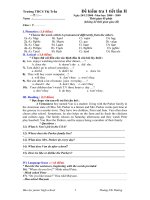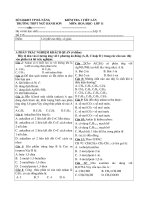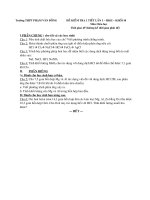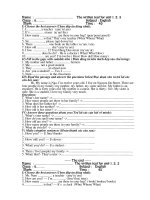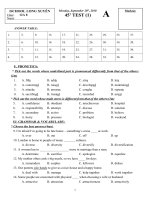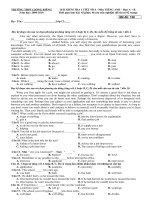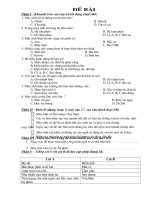De kiem tra 1 tiet lan 1
Bạn đang xem bản rút gọn của tài liệu. Xem và tải ngay bản đầy đủ của tài liệu tại đây (120.41 KB, 8 trang )
<span class='text_page_counter'>(1)</span>CLASS: 12C NAME: ………………………………… …… MARKS. Tuesday, September 28th , 2010. ONE PERIOD TEST 1 TEACHER’S REMARKS. Choose the word whose main stress is put on a different syllable from that of the others. 1.. A. signal. B. sorrow. C. maintain. D. patient. 2.. A. polite. B. remind. C. police. D. circus. Choose the word whose underlined part is pronounced differently from that of the others. 3.. A. serves. B. hopes. C. likes. D. writes. 4.. A. looked. B. washed. C. caused. D. laughed. Choose the word or phrase (A, B, C or D) that best completes each sentence. 5. I don't have my own room. I have to_______ the bedroom with my elder brother. A. divide. B. share. C. separate. D. live. 6. Katie is a very _______ girl. She can make friends easily even though she is in a strange place. A. shy. B. unfriendly. C. sociable. D. reticent. 7. Arnold _______ for all the trouble he had caused to us. A. complimented. B. complained. C. excused. D. apologized. 8. By the time I got to the dentist, the pain in my tooth _______ stopped. A. had. B. has. C. was. D. would. 9. In the last thirty years, space exploration_______ great contributions to weather forecasting. A. makes. B. has made. C. is making. D. made. C. for. D. with. 10. Carol is excited _______ starting her new job. A. about. B. to. 11. - What an attractive hair style you have got, Mary!. - _______. A. Thank you very much. I am afraid. B. You are telling a lie. C. Thank you for your compliment. D. I don't like your sayings. 12. A:____________ a happy marriage should be based on love. A. I really know. B. As I see it. C. Personally, I think. B: I definitely agree! D. Do you think. 13. A: I'm not sure about this soup. It tastes like something's missing. B: _______ It tastes fine to me. A. I don't think so.. B. Oh, I don't know.. C. I couldn't agree more. D. You're right.. 14. A: This grammar test is the hardest one we've ever had this semester! B: _______ but I think it's quite easy. A. I couldn't disagree more. B. I understand what you're saying. C. You're right. D. I don't see it that way. 15. Give the _______ to the dog. A. food. B. meal. C. leftovers. D. dish.
<span class='text_page_counter'>(2)</span> 16. In English, the subject precedes the verb. A. comes first. B. comes after. C. be in front. D. comes before. 17. My sister has been a newsreader on TV _______ she finished university. A. as. B. for. C. when. D. since. 18. His achievements were partly due to the _______ of his wife. A. assistance. B. assistant. C. assisted. D. assist. 19. Some candidates failed the oral examination because they didn't have enough _______. A. confide. B. confident. C. confidence. D. confidential. 20. Last week Clara said "I'll do it tomorrow." She said she would do it _______. A. tomorrow. B. the following day. C. the previous day. D. yesterday. 21. I told him ____ the word to Jane somehow that I _____ to reach her during the early hours. A. passing / will try. B. he will pass / tried. C. to pass / would be trying. D. he passed / have tried. 22. John asked me _______ interested in any kind of sports. A. if I were. B. if were I. C. if was I. D. if I was. 23. John asked me _______ in English. A. what does this word mean. B. what that word meant. C. what did this word mean. D. what that word means. Identify the word / phrase that must be changed to make the sentence correct. 24. Mrs. Thatcher has become Prime Minister in 1979 after winning the elections . A. B. C. D. 25. When they lived in Indonesia, they were used to eating Indonesian food. A. B. C. D. 26. He’ll phone you as soon as he will get home. Don’t worry. A. B. C. D. 27. I read a book and then I was going to sleep. A. B. C. D. Read the passage and choose the best answers. Psychologists tell us that there are four basic stages that human beings pass through when they enter and live in a new culture. This process, which helps us to deal with culture shock, is the way our brain and our personality reacts to the strange new things we encounter when we move from one culture to another. Culture begins with the “honeymoon stage”. This is the period of time when we first arrive in which everything about the new culture is trance and exciting. We may be suffering from “jet lag” but we are thrilled to be in the new environment, seeing new sights, hearing new sounds and language, eating new kinds of food. This honeymoon stage can last for quite a long time because we feel are involved in some kind of great adventure. Unfortunately, the second stage of culture shock can be more difficult. After we have settled down into our new life, working or studying, buying groceries, doing laundry, or living with a.
<span class='text_page_counter'>(3)</span> home-stay family, we can become very tired and begin to miss our homeland and our family, girlfriend or boyfriend, pets. All the little problems that everybody in life has seem to be much bigger and more disturbing when you face them in a foreign culture. This period cultural adjustment can be very difficult and lead to the new arrival rejecting or pulling away from the new culture. This “rejection stage” can be quite dangerous because the visitor may develop unhealthy habits (smoking and drinking too much, being too concerned over food or contact with people from the new culture). This stage is considered a crisis in the process of cultural adjustment and many people choose to go back to their homeland or spend all their time with people from their own culture speaking their native language. The third stage of culture shock is called the “ adjustment stage”. This is when you begin to realize that things are not so bad in the host culture. Your sense of humor usually by learning to take care of yourself in the new place. Things are still difficult, but you are now are now a survivor! The fourth stage can be called “at ease at last “. Now you feel quite comfortable in your new surroundings. You can cope with most problems that occur. You may still have problems with the language, but you know you are strong enough to deal with them. If you meet someone from your country who has just arrived, you can be the expert on life in the new culture and help them to deal with their culture shock. There is a fifth stage of culture shock “. Surprisingly, this occurs when you go back to your native culture and you have changed and that things there have changed while you have been away. Now you feel a little uncomfortable back home. Life is a struggle! 28. When dose culture shock happen? A. When you reach your teens. B. When you move to a big city. C. When you meet foreign people for the first time. D. When you go to live in a foreign. 29. How do you feel during the first stage of culture shock? A. Lonely and depressed.. B. Bored and homesick.. C. Strange and excited.. D. Angry and frustrated.. 30. How do you feel during the second stage? A. Interested and amused.. B. Homesick and tired.. C. Stressed and tired.. D. you have no particular feelings.. 31. How could the third stage be described? A. Adjustment.. B. Rejection.. C. Enthusiasm.. D. Happy.. Choose the suitable word to fill in each blank. FAMILY PATTERNS The United States has many different types of families. While most American families are traditional, comprising a father, mother and one or more children, 22 percent of all American families in 1988 were headed by one parent, usually a woman. In a few families in the United States, there are no children. These (32) _____ couples may believe that they would not make good parents; they may want freedom from the (33) _____ of childrearing; or, perhaps they are not physically able to have children. Other families in the United States have one adult who is a.
<span class='text_page_counter'>(4)</span> stepparent. A stepmother or stepfather is a person who joins a family by marrying a father or mother. Americans tolerate and accept these different types of families. In the United States, people have the right to privacy and Americans do not (34) in telling other Americans what type of family group they must belong to. They respect each other’s (35) _____ regarding family groups. Families are very important to Americans. 32. A. children. B. offspring. C. childless. D. not child. 33. A. jobs. B. responsibilities. C. burdens. D. care. 34. A. trust. B. accept. C. consider. D. believe. 35. A. choices. B. chooses. C. selections. D. options. Choose the sentence which is closest in meaning to the original one. 36. They are still playing tennis after three hours. A. They have been playing tennis for three hours. B. They had been playing tennis for three hours. C. They had played tennis for three hours. D. They have played tennis for three hours. 37. The last time I saw him was in 2001. A. I didn’t see him since 2001. B. I hadn’t seen him since 2001. C. I have seen him in 2001. D. I haven’t seen him since 2001. 38. You can enrich your knowledge by listening to the radio. A. Listening to the radio makes you know less. B. Listening to the radio makes you know more. C. Listening to the radio enables you to be rich. D. Listening to the radio makes your knowledge rich. 39. The secret to success is hard work. A. Working hard ensures success. B. One must work hard to keep secrets. C. One cannot succeed if he has secrets. D. If you keep your work secret, you will succeed. 40. My father hasn't smoke for three years. A. My father started smoking three years ago. B. My father stopped smoking three years ago. C. My father quit smoking for three years. D. My father won't continue smoking in three years' time. THE END! -----GOOD LUCK TO YOU!-----.
<span class='text_page_counter'>(5)</span> CLASS: 12C NAME: ………………………………… …… MARKS. Tuesday, September 28th , 2010. ONE PERIOD TEST 1 TEACHER’S REMARKS. Choose the word whose main stress is put on a different syllable from that of the others. 1.. A. polite. B. remind. C. police. D. circus. 2.. A. signal. B. sorrow. C. maintain. D. patient. Choose the word whose underlined part is pronounced differently from that of the others. 3.. A. looked. B. washed. C. caused. D. laughed. 4.. A. serves. B. hopes. C. likes. D. writes. Choose the word or phrase (A, B, C or D) that best completes each sentence. 5. Katie is a very _______ girl. She can make friends easily even though she is in a strange place. A. shy. B. unfriendly. C. sociable. D. reticent. 6. I don't have my own room. I have to_______ the bedroom with my elder brother. A. divide. B. share. C. separate. D. live. 7. By the time I got to the dentist, the pain in my tooth _______ stopped. A. had. B. has. C. was. D. would. 8. Arnold _______ for all the trouble he had caused to us. A. complimented. B. complained. C. excused. D. apologized. C. for. D. with. 9. Carol is excited _______ starting her new job. A. about. B. to. 10. In the last thirty years, space exploration_______ great contributions to weather forecasting. A. makes. B. has made. C. is making. 11. A:____________ a happy marriage should be based on love. A. I really know. B. As I see it. C. Personally, I think. 12. - What an attractive hair style you have got, Mary!. D. made B: I definitely agree! D. Do you think - _______. A. Thank you very much. I am afraid. B. You are telling a lie. C. Thank you for your compliment. D. I don't like your sayings. 13. A: This grammar test is the hardest one we've ever had this semester! B: _______ but I think it's quite easy. A. I couldn't disagree more. B. I understand what you're saying. C. You're right. D. I don't see it that way. 14. A: I'm not sure about this soup. It tastes like something's missing. B: _______ It tastes fine to me. A. I don't think so.. B. Oh, I don't know.. C. I couldn't agree more. D. You're right.. 15. In English, the subject precedes the verb. A. comes first. B. comes after. C. be in front. D. comes before.
<span class='text_page_counter'>(6)</span> 16. Give the _______ to the dog. A. food. B. meal. C. leftovers. D. dish. 17. His achievements were partly due to the _______ of his wife. A. assistance. B. assistant. C. assisted. D. assist. 18. My sister has been a newsreader on TV _______ she finished university. A. as. B. for. C. when. D. since. 19. Last week Clara said "I'll do it tomorrow." She said she would do it _______. A. tomorrow. B. the following day. C. the previous day. D. yesterday. 20. Some candidates failed the oral examination because they didn't have enough _______. A. confide. B. confident. C. confidence. D. confidential. 21. John asked me _______ interested in any kind of sports. A. if I were. B. if were I. C. if was I. D. if I was. 22. I told him ____ the word to Jane somehow that I _____ to reach her during the early hours. A. passing / will try. B. he will pass / tried. C. to pass / would be trying. D. he passed / have tried. 23. John asked me _______ in English. A. what does this word mean. B. what that word meant. C. what did this word mean. D. what that word means. Identify the word / phrase that must be changed to make the sentence correct. 24. When they lived in Indonesia, they were used to eating Indonesian food. A. B. C. D. 25. Mrs. Thatcher has become Prime Minister in 1979 after winning the elections . A. B. C. D. 26. I read a book and then I was going to sleep. A. B. C. D. 27. He’ll phone you as soon as he will get home. Don’t worry. A. B. C. D. Read the passage and choose the best answers. Psychologists tell us that there are four basic stages that human beings pass through when they enter and live in a new culture. This process, which helps us to deal with culture shock, is the way our brain and our personality reacts to the strange new things we encounter when we move from one culture to another. Culture begins with the “honeymoon stage”. This is the period of time when we first arrive in which everything about the new culture is trance and exciting. We may be suffering from “jet lag” but we are thrilled to be in the new environment, seeing new sights, hearing new sounds and language, eating new kinds of food. This honeymoon stage can last for quite a long time because we feel are involved in some kind of great adventure. Unfortunately, the second stage of culture shock can be more difficult. After we have settled down into our new life, working or studying, buying groceries, doing laundry, or living with a.
<span class='text_page_counter'>(7)</span> home-stay family, we can become very tired and begin to miss our homeland and our family, girlfriend or boyfriend, pets. All the little problems that everybody in life has seem to be much bigger and more disturbing when you face them in a foreign culture. This period cultural adjustment can be very difficult and lead to the new arrival rejecting or pulling away from the new culture. This “rejection stage” can be quite dangerous because the visitor may develop unhealthy habits (smoking and drinking too much, being too concerned over food or contact with people from the new culture). This stage is considered a crisis in the process of cultural adjustment and many people choose to go back to their homeland or spend all their time with people from their own culture speaking their native language. The third stage of culture shock is called the “ adjustment stage”. This is when you begin to realize that things are not so bad in the host culture. Your sense of humor usually by learning to take care of yourself in the new place. Things are still difficult, but you are now are now a survivor! The fourth stage can be called “at ease at last “. Now you feel quite comfortable in your new surroundings. You can cope with most problems that occur. You may still have problems with the language, but you know you are strong enough to deal with them. If you meet someone from your country who has just arrived, you can be the expert on life in the new culture and help them to deal with their culture shock. There is a fifth stage of culture shock “. Surprisingly, this occurs when you go back to your native culture and you have changed and that things there have changed while you have been away. Now you feel a little uncomfortable back home. Life is a struggle! 28. When dose culture shock happen? A. When you meet foreign people for the first time. B. When you go to live in a foreign. C. When you reach your teens. D. When you move to a big city. 29. How do you feel during the first stage of culture shock? A. Strange and excited.. B. Angry and frustrated.. C. Lonely and depressed.. D. Bored and homesick.. 30. How do you feel during the second stage? A. Stressed and tired.. B. you have no particular feelings.. C. Interested and amused.. D. Homesick and tired.. 31. How could the third stage be described? A. Adjustment.. B. Rejection.. C. Enthusiasm.. D. Happy.. Choose the suitable word to fill in each blank. FAMILY PATTERNS The United States has many different types of families. While most American families are traditional, comprising a father, mother and one or more children, 22 percent of all American families in 1988 were headed by one parent, usually a woman. In a few families in the United States, there are no children. These (32) _____ couples may believe that they would not make good parents; they may want freedom from the (33) _____ of childrearing; or, perhaps they are not physically able to have children. Other families in the United States have one adult who is a.
<span class='text_page_counter'>(8)</span> stepparent. A stepmother or stepfather is a person who joins a family by marrying a father or mother. Americans tolerate and accept these different types of families. In the United States, people have the right to privacy and Americans do not (34) in telling other Americans what type of family group they must belong to. They respect each other’s (35) _____ regarding family groups. Families are very important to Americans. 32. A. children. B. offspring. C. childless. D. not child. 33. A. jobs. B. responsibilities. C. burdens. D. care. 34. A. trust. B. accept. C. consider. D. believe. 35. A. choices. B. chooses. C. selections. D. options. Choose the sentence which is closest in meaning to the original one. 36. They are still playing tennis after three hours. A. They had been playing tennis for three hours. B. They have been playing tennis for three hours. C. They had played tennis for three hours. D. They have played tennis for three hours. 37. The last time I saw him was in 2001. A. I have seen him in 2001. B. I haven’t seen him since 2001. C. I didn’t see him since 2001. D. I hadn’t seen him since 2001. 38. You can enrich your knowledge by listening to the radio. A. Listening to the radio makes you know less. B. Listening to the radio makes you know more. C. Listening to the radio makes your knowledge rich. D. Listening to the radio enables you to be rich. 39. The secret to success is hard work. A. One must work hard to keep secrets. B. Working hard ensures success. C. One cannot succeed if he has secrets. D. If you keep your work secret, you will succeed. 40. My father hasn't smoke for three years. A. My father stopped smoking three years ago. B. My father started smoking three years ago. C. My father quit smoking for three years. D. My father won't continue smoking in three years' time. THE END! -----GOOD LUCK TO YOU!-----.
<span class='text_page_counter'>(9)</span>
